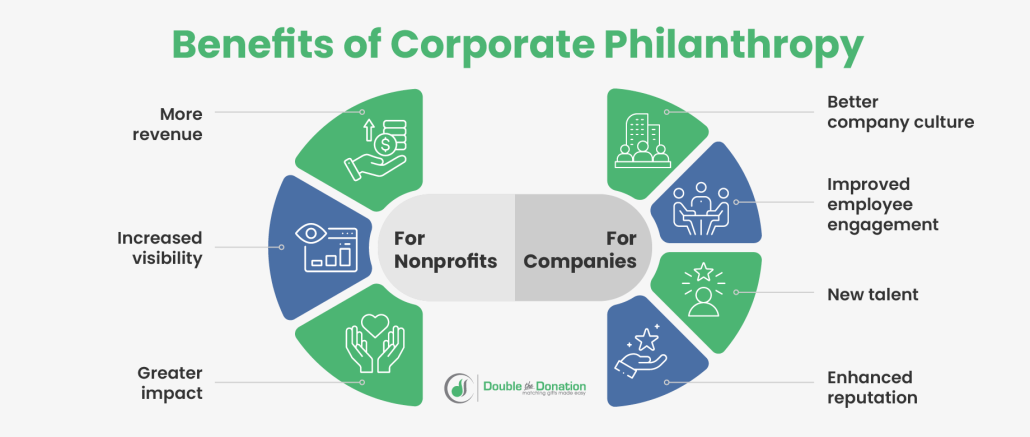Collaboration over competition: How nonprofits benefit from corporate philanthropy
Discovering Just How Corporate Philanthropy Shapes Brand Track Record and Customer Loyalty
Company philanthropy substantially affects brand name credibility and client commitment. Firms that participate in genuine philanthropic efforts frequently see a positive change in how consumers regard them. This placement of worths promotes trust and emotional links with target markets. Nevertheless, the efficiency of these kind efforts can vary greatly. Recognizing what really resonates with consumers is crucial for brands seeking to enhance their social effect and market setting. What approaches will become essential for future success?
The Advancement of Corporate Philanthropy
As services increasingly recognize their role in society, the development of corporate philanthropy has actually transformed from mere philanthropic donations to a tactical element of brand identity. Companies involved in philanthropy mostly for tax obligation advantages or to improve their public image. With time, this strategy shifted as stakeholders-- consisting of workers, customers, and capitalists-- demanded an extra genuine dedication to social obligation.
Organizations started aligning their humanitarian efforts with their core values and organization purposes, bring about even more thoughtful and impactful contributions. This modification has actually encouraged firms to buy sustainable methods and community growth, fostering a sense of objective that reverberates with consumers.
Furthermore, technical advancements have helped with transparency and engagement, enabling services to display their humanitarian initiatives better. As a result, corporate philanthropy has actually arised as an important part of service technique, with organizations welcoming the possibility to positively influence culture while improving their total brand name narrative.
The Effect of Philanthropy on Brand Name Assumption
While business take part in kind initiatives to promote social excellent, these initiatives considerably shape brand name understanding among customers. Corporate philanthropy can improve a brand's picture by linking it with positive social influence and community involvement. Customers commonly perceive brand names that proactively participate in philanthropic tasks as more trustworthy and liable. This perception can affect purchasing decisions, as customers may favor brands that demonstrate a dedication to social issues.

Building Emotional Links With Providing
Corporate philanthropy works as a powerful device for boosting brand name identity by linking company values with neighborhood demands. Through tactical providing, business can cultivate community interaction and produce common worths that reverberate with customers on a psychological degree. This strategy not just enhances brand name online reputation yet additionally builds lasting connections between businesses and their stakeholders.
Enhancing Brand Identification
When business involve in humanitarian initiatives, they not only contribute to societal good but likewise create deeper emotional connections with their audiences. By straightening their brand name with charitable causes, companies boost their identification and signal values that resonate with customers. This alignment develops a story that goes beyond services and products, inviting consumers to join a common objective. As consumers significantly focus on purpose-driven brands, companies that proactively take part in providing can differentiate themselves in a jampacked market. Such efforts promote a feeling of commitment among consumers that feel directly connected to the brand name's values. Ultimately, company philanthropy ends up being a vital device for enhancing brand identification, growing lasting partnerships based on common beliefs and emotional engagement.
Fostering Neighborhood Engagement
Countless research studies show that business engaging in community-focused humanitarian initiatives can markedly enhance emotional connections with their stakeholders. By spending in regional tasks and supporting social reasons, businesses grow a sense of belonging and depend on within the community. This interaction cultivates a positive brand name image, as clients value companies that demonstrate real concern for social concerns. Additionally, staff members frequently really feel extra inspired and honored to be connected with an organization that prioritizes neighborhood well-being. Consequently, consumers are much more likely to establish commitment in the direction of brand names that actively contribute to meaningful causes. Eventually, cultivating area involvement through philanthropy not only enhances brand credibility however likewise builds long lasting emotional ties that benefit both the business and the neighborhood it serves.
Producing Shared Values
Exactly how can companies efficiently produce shared values that resonate with their stakeholders? Companies can achieve this by straightening their kind initiatives with their core goal and the rate of interests of their neighborhoods. By engaging in efforts that resolve local requirements, companies cultivate psychological links with consumers, boosting brand loyalty. As an example, partnering with non-profits that reflect shared values reinforces the brand name's picture and demonstrates dedication to social obligation. Additionally, transparent interaction regarding these efforts allows stakeholders to see the substantial effect of their contributions. Eventually, by incorporating common values right into their company philanthropy, business not only boost their track records but also cultivate long-term connections with customers, causing enhanced commitment and depend on. This alignment is crucial in modern-day consumer decision-making.
Instance Studies: Effective Philanthropic Campaigns
Taking a look at successful humanitarian campaigns exposes different techniques that boost brand reputation. Impactful neighborhood Learn More campaigns, innovative collaboration models, and long-lasting engagement methods have verified reliable in promoting favorable connections with consumers. These study highlight the value of thoughtful corporate giving up achieving both social and organization goals.
Impactful Community Initiatives
Many firms have successfully leveraged humanitarian projects to enhance their brand track record while making a purposeful impact in their neighborhoods. An innovation company released an electronic proficiency program in underserved neighborhoods, offering training and resources that equipped regional citizens. This campaign not just added to area development but also positioned the company as a socially responsible leader. Similarly, a major food business carried out an appetite alleviation project, partnering with regional nonprofits to disperse meals to households in need. This effort enhanced community ties and cultivated consumer commitment. With these impactful efforts, companies have shown their dedication to social duty, properly straightening their brand values with the demands of the areas they serve, ultimately enhancing their total online reputation.
Cutting-edge Partnership Models
The success of impactful area efforts commonly hinges on innovative collaboration designs that unite varied stakeholders to attend to facility social difficulties. Case researches show just how companies, non-profits, and government entities can team up efficiently. A multinational firm partnered with a regional charitable to introduce an education and learning program, pooling sources and competence to enhance neighborhood proficiency rates. An additional example included a technology business and a medical care organization signing up with forces to establish a telemedicine solution for underserved populations. These collaborations not only intensified the reach of philanthropic initiatives yet also enhanced the brand names' credibilities by straightening their missions with community demands. Ultimately, ingenious collaboration models act as a stimulant for meaningful modification and foster more powerful links in between brands and their consumers.
Lasting Involvement Approaches

Determining the ROI of Corporate Social Responsibility
As firms significantly spend in business social obligation (CSR) initiatives, understanding the roi (ROI) related to these initiatives ends up being vital. Measuring ROI in CSR is complex, usually including both quantitative and qualitative metrics. Monetary returns can be assessed through raised sales, improved brand commitment, and enhanced employee spirits, which can result in greater efficiency. Additionally, firms may analyze price savings connected to sustainable techniques, such as minimized waste or energy intake.
Qualitatively, the impact of CSR on brand name credibility can be reviewed with customer understanding researches and social networks sentiment evaluation. Studies can supply understandings into just how CSR activities affect consumer loyalty and trust fund. Additionally, benchmarking versus industry requirements can help organizations determine their CSR effectiveness. Ultimately, a detailed method to determining ROI makes it possible for companies to make educated choices about future CSR investments, straightening strategies with both financial performance and social influence
Customer Expectations and Corporate Obligation
Significantly, customers expect companies to operate with a strong feeling of company duty, viewing honest methods as a requirement for brand name commitment. This change in assumption mirrors a growing awareness of environmental and social problems, leading clients to prefer brand names that line up with their worths. Consumers are a lot more likely to sustain firms that involve in clear techniques, show sustainability, and add positively to their communities.
Moreover, social media amplifies these assumptions, enabling consumers to share their experiences and opinions quickly. Brands that fail to fulfill these honest standards risk reaction, while those that accept corporate duty commonly delight in superior online reputation and client loyalty. As customers demand liability, business must incorporate business social responsibility right into their core approaches, prioritizing ethical habits not simply as a marketing technique, however as a fundamental facet of their operations. This placement can inevitably bring about stronger brand name affinity and continual success in open markets.
Future Patterns in Corporate Philanthropy and Brand Name Commitment
The landscape of business philanthropy is advancing, influenced by the increased customer expectations bordering corporate obligation. Firms are progressively incorporating social effect right into their core service approaches, not just as a secondary activity. Future fads suggest a change toward openness, with brand names sharing comprehensive details about their humanitarian campaigns and their straight effects on neighborhoods.
Moreover, innovation is playing an essential function, allowing real-time involvement between brands and consumers. Social media platforms help with straight interaction, permitting customers to articulate their assumptions and hold brand names answerable. Additionally, younger generations, particularly Millennials and Gen Z, prioritize sustainability and ethical practices, driving companies to embrace more conscientious methods.
As business philanthropy ends up being associated with brand name identification, companies that authentically align their goals with social requirements are likely to foster more powerful consumer commitment. This merging of worths will eventually shape the future of business credibility and consumer relationships in an increasingly diligent industry.
Regularly Asked Concerns
Exactly How Do Consumers Learn about a Firm's Philanthropic Initiatives?
Consumers discover a firm's kind initiatives with different channels, consisting of social networks, press releases, community occasions, and word-of-mouth. These opportunities help with awareness, making it possible for people to engage with brand names that line up with their passions and values.
What Role Does Staff Member Involvement Play in Corporate Philanthropy?
Staff member involvement in company philanthropy improves engagement, cultivates a feeling of possession, and reinforces group cohesion - corporate philanthropy. This engagement commonly enhances the influence of charitable campaigns, causing greater understanding and support for the company's kind efforts
Can Corporate Philanthropy Backfire on a Brand name's Credibility?
Company philanthropy can undoubtedly backfire on a brand name's credibility if regarded as insincere or opportunistic. Unfavorable public assumption may develop, leading to reduced trust and loyalty amongst customers who prioritize credibility in company actions.
Are Smaller Companies as Reliable in Philanthropy as Larger Corporations?
Smaller business can be just as effective in philanthropy as larger companies, often demonstrating dexterity and credibility. Their local efforts may resonate much more deeply with neighborhoods, cultivating real links despite restricted resources compared to their larger equivalents.
Just How Can Firms Choose the Right Causes to Support?
Business can select the ideal reasons by straightening their worths with neighborhood demands, assessing stakeholder interests, and evaluating potential impact. Find Out More This tactical method promotes authenticity, improves interaction, and enhances connections with clients and the wider neighborhood.
While business engage in humanitarian efforts to promote social good, these initiatives greatly form brand name assumption amongst consumers. As consumers progressively prioritize purpose-driven brand names, firms that proactively engage in providing can differentiate themselves in a crowded market. Many firms have efficiently leveraged humanitarian campaigns to enhance their brand credibility while making a significant effect in their areas. Progressively, customers anticipate firms to run with a strong feeling of company obligation, seeing ethical techniques as a requirement for brand commitment. As business philanthropy becomes identified with brand identity, firms that authentically align their missions with social requirements are likely to promote stronger consumer loyalty.